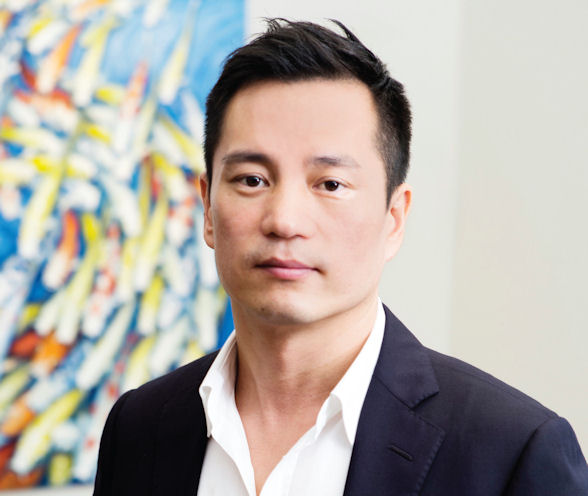This article first appeared in the Nov/Dec 2015 issue of WGM.
One of Asia’s most prominent junket operators with over 160 gaming tables across 11 VIP Rooms, Tak Chun Group is also one of the few to have so far ridden out the recent Macau downturn. In fact, while other junkets have closed VIP Rooms or departed Macau altogether, Tak Chun has flourished and recently launched a new brand identity as well as expanding into the Philippines and Korea. WGM CEO Andrew W Scott was granted a rare opportunity to sit down with Tak Chun Group Chairman Mr Levo Chan to discuss the junket’s history, the challenges currently facing VIP business in Macau and the company’s plans for the future.

Andrew W Scott: Mr Chan, first of all we here at WGM would like to thank you very much for agreeing to sit down and speak with us. We’re aware this is the first interview you’ve done in over five years so thank you for choosing WGM. Let’s start at the beginning. Can you tell us a bit about your background? Where did you grow up?
Levo Chan: I was originally from Jinjiang City, Fujian Province. After graduating from primary school I came to live in Macau with my family and I finished my study here in Macau. When I first came to Macau it was difficult to find a school because I didn’t speak Cantonese so I had to learn the language before I was successfully admitted to a school and completed my study.
When I was a kid, I lived in Areia Preta. At that time, people who lived in Areia Preta were poor so they were very diligent. However, back then most of the Fujian people gathered there, so Areia Preta was like a little Fujian. Everyone spoke the hometown dialect and they were very simple people which helped me feel very warm.
AWS: How did you first get into the VIP business?
LC: In the 1980s and 1990s the industries most popular with Macau graduates were civil servants, real estate or the casino industry. At that time, the Macau VIP business had just started but when I finished my education I expected this industry to have great development so I started to get involved. I started from scratch and witnessed the take-off of the VIP business.
AWS: What are your memories of the VIP industry back then? How many operators were there and how does it compare the VIP business today?
LC: In 2002 before the liberalization of the gaming industry, there was only one company holding a gaming license (STDM) and VIP rooms were all at Lisboa casino. Back then opening a VIP room required strong network connections and STDM’s approval, so there was a certain degree of difference between the VIP business at that time and the current model. It was also very different in terms of its source of customers. The main customers were from Taiwan , Hong Kong and Japan, while Mainland China only accounted for a small proportion. It was different in terms of customers opening accounts too. Back then, customers had to be introduced by someone they knew in order to open an account in the VIP room. Under the current model they can instantly open an account. In addition, the junket business was all operated by local people back then. It was hard for them to open an account in the VIP room, VIP rooms wouldn’t provide a credit service to them and commission was only around half of what it is now. Therefore, there was no risk of bad debts, the commission was low, plus there were less competitors so the VIP rooms at that time were more profitable and easier to manage.
![[b]Around 30 volunteers participated in the opening ceremony for the first, second and third Tak Chun primary schools in Hongtudizhen, Kunming, on 23 May 2015. Around 450 students and staff were assisted and more than 100 students were sponsored through Tak Chun's child sponsorship plan.[/b]](http://www.wgm8.com/wp-content/uploads/2015/10/images_wgm_1038_tak-chun-levo-chan-2.jpg)
AWS: Can you tell us a bit about Tak Chun – how and where did it start? How does it want to be positioned and known in the Macau gaming industry and the wider community?
LC: After the liberalization of the Macau gaming industry, the VIP business was in the incubation stage before explosion. I foresaw its vigorous development and the future demand so I started the first VIP Club in StarWorld in 2007 with a few friends working in the gaming industry. That same club is still there – the StarWorld Tak Chun VIP Club.
Because the time was right and the policy of “service first, steady progress” that we adhered to was effective, the Group continued to expand its business network and attract more and more customers, laying a solid foundation for creating a prominent entertainment and gaming kingdom.
Tak Chun Group is also very concerned about the development of Macau society and the needs of different sectors. Tak Chun Charity Association was established on 11 June 2012. It is a non-profit, independent charity organization. Its purpose is to “care for the community, promote charity activities and participate in social services”. It tries to understand the real needs of the disadvantaged community and make contributions to society. In recent years, Tak Chun Charity Association has promoted education more actively. It donated to and established 10 primary schools on the mainland in 2015, making contributions to fostering talent. Our development policy over the next 12 months is mainly to continue to promote education, organize more free education and bring more resources to poor families.

AWS: In what ways is Tak Chun different from other junket operators?
LC: In the past eight years, Tak Chun has developed from a single VIP Club to a company that does business in every large-scale resort and five-star hotel in Macau. At present we have 11 VIP Clubs with more than 160 tables. We now have a certain proportion of the Macau gaming market and our business has spread to lots of places overseas too. Since our inception our group has strived to bring better service for our guests.
Take the current situation of Macau’s gaming industry as an example. Macau’s gaming industry has now declined compared with a few years ago. Faced with this dilemma, many VIP Clubs chose to reduce business to remain in operation. However, Tak Chun hasn’t reduced its business, instead we have set up new VIP Clubs in Altira and Galaxy II – constantly expanding our offering.
We hope not only to maintain the quality of our service to the guests but actually to improve the quality of service to enhance our attractiveness and competitiveness. This is why Tak Chun has recently updated its brand image.
AWS: Tak Chun has a reputation for being more financially stable and more conservative than other junkets. Do you consider this to be accurate? Why?
LC: Tak Chun Group attaches great importance to its management. It has a stable management structure and a wealth of experience in the gaming entertainment industry. The group has high quality staff, most of whom have high qualifications and rich industry experience. We also refer to international best practices in order to achieve standardized systems in terms of account management, auditing, anti-money laundering, contract approval and so on.

Our loan approval processes and systems are very strict and long established. Because of a range of factors, we have become a financially more robust and more conservative company and we stand out in Macau among our many competitors.
AWS: Why is Tak Chun rebranding? Are your shareholders changing?
LC: Absolutely not. The reforms we’re making aren’t about that. It’s more about moving away from a traditional conservative style to create a trendy, distinguished and stable new modern image. We want to strengthen our brand recognition in the marketplace and bring a refreshed new feeling to the gaming industry.
In the design of the logo we used the diamond pattern that the group has always used, but we’ve made subtle changes so that the new logo is in the shape of a shining gem. We want to convey a meaning that Tak Chun has a unique appeal in the VIP business.
AWS: You also have rooms at Solaire in Manila and at Walker Hill in Korea. How are these rooms doing and have they been affected (either positively or negatively) by the downturn in Macau? How is gaming different in the Philippines and Korea compared to Macau?
LC: Tak Chun’s VIP Clubs overseas usually source players from the local or surrounding areas. This is different to the source of our Macau VIP Clubs, so the downturn in Macau hasn’t had a big impact on the overseas VIP Clubs. Instead, local customers can come to Macau through our network, so that the gaming industry in Macau is further developed.
![[b]Tak Chun Group distributed supplies to children living in the Kunming mountain district in November 2014[/b]](http://www.wgm8.com/wp-content/uploads/2015/10/images_wgm_1038_tak-chun-levo-chan-5.jpg)
In order to expand business as a junket operator, we must have a broader vision. The developing Philippines and South Korea gaming markets provide an international platform for our business expansion. We can move towards being an international company.
Compared with Macau, the Philippines’ political situation is complicated; its tourism facilities are not yet perfect and its gaming business is not as mature as Macau’s. In South Korea, the authorities restrict locals from entering casinos so players are mainly sourced from overseas. Therefore if the tourism industry is adversely affected, the gaming industry will be the first to be hit.
In contrast, Macau has a number of established and high standard large resorts and hotels so it is more capable of developing into a more mature and stable entertainment and gaming destination. But in recent years, the governments of the Philippines and South Korea have been vigorously promoting the gaming industry. We can see that they are all keen to develop their gaming industries.
AWS: Can you tell us a bit about Tak Chun’s staff? What do you look for when hiring someone to work for Tak Chun? Given the shortage of labor in Macau, how do you go about not only finding good staff but also retaining them?
LC: The staff at Tak Chun are young and have high qualifications and an international perspective. Most employees have a Bachelor or Master’s degree.
When we hire employees we pay a lot of attention to their credibility – after all, our industry is very money sensitive. Just as our Group does, our staff should have an international perspective and should be willing to learn and grow. Employees should have a good working attitude that leads them to provide premium service.
Our group provides appropriate internal training and upward mobility. There is great potential for our people to expand their horizons to new management positions. At the same time, the development of the group moves in a stable fashion at a gradual pace – we won’t develop a new VIP room until the previous one has become operationally mature. Tak Chun Group is like a big family, with a low loss rate of employees. The labor shortage problem has little impact on us.
![[b]Mr Chan started his first VIP Club at StarWorld in 2007[/b]](http://www.wgm8.com/wp-content/uploads/2015/10/images_wgm_1038_tak-chun-levo-chan-6.jpg)
AWS: Junkets were established by Stanley Ho way back in the 1970s. How has their role changed in the last 40 years?
LC: Dr Ho made a number of great contributions to the VIP room business. He developed the VIP room as a new business model for the gaming industry.
VIP rooms used to be small. They only had two or three tables. Today, they have evolved into an enterprise model. The VIP business is all over Macau, and some junkets even have over 100 tables. The expansion of the existing VIP business enables the guests to have greater choice. Guests can enjoy the “one stop” VIP service through junket operators so that even in different casinos they can enjoy the same quality service.
AWS: The current narrative in Macau goes something like this: there’s currently a liquidity crisis amongst the VIP operators and the measures taken in the mainland against capital flight will exacerbate the effect of the campaign against corruption in China. On top of that we have the “chilling effect” of the current situation in China which sees wealthy mainlanders avoiding flaunting their wealth in Macau’s casinos. All of these things make the current situation very tough for junkets and we’ve seen a number of VIP rooms close and junket operators leave the market.
Some people even say the junket model is broken and junkets are slowly but surely dying. Perhaps in five or 10 years we will only have a handful of the most robust junkets left or maybe even none at all. As the leader of one of Macau’s strongest junkets you’re in a perfect position to comment on this. What’s your view on the junket situation in Macau right now and how it will most likely evolve over the next five years?

LC: I’m still full of confidence in the industry. It’s true the domestic anti-corruption action, bank credit and policy tightening has made China’s economy go through a structural adjustment. It is more difficult for Mainland enterprises to operate and visitors to Macau have less desire for high consumption. Therefore just as business has adjusted pace in the mainland, the junket business has also entered an adjustment period.
In the past seven years, Macau’s gaming industry peaked and the junket business grew explosively. Gaming revenue around 2012 and 2013 was seven times higher than the world’s most famous gaming city, Las Vegas. The main source of that income was the junket business. Now the industry must adjust its pace so that the industry can grow more steadily.
In the future, junkets will still be an indispensable sector in the gaming industry. Not only do I think the junket business won’t be eliminated, but it will actually be paid more attention by the government. While this is happening the entire industry will become more professional and more important under the supervision of the government. Tak Chun Group is moving forward in this new direction.
AWS: What are your thoughts on the recent theft case involving Dore Entertainment Group? Is this something that could happen again? Is there a concern this could have a negative impact on other junket operators?
LC: This issue has now entered the judicial process, so I’m not in a position to make any direct comment.
But I think this incident is actually not a bad thing for the industry because it can serve as an alarm to remind the industry to improve management, strengthen monitoring and do better. I believe the DICJ will take appropriate measures and adjustments in this matter. The industry is also very willing to cooperate with the government to improve in order to strengthen the public’s confidence in the gaming industry in Macau.

AWS: What are your thoughts on the government’s statement that there will be more oversight of the junket industry?
LC: Recently there have been many comments on loopholes in the legislation that regulates the supervision of junket operators. Scholars have put forward a lot of valuable advice regarding how to rectify the VIP service. Tak Chun Group is a large-scale enterprise and I very much hope the industry implements good measures to support this supervision.
The law needs to advance with the times. We should trust the government, give them space and time to amend the law, to establish a set of standards for the industry so that the operating model of junket operators can achieve the recognition of international financial institutions.
The VIP business has always been unique to Macau – there is no precedent for our business model. Therefore we can only rely on ourselves to explore these issues and continue to make improvements in order to succeed.
I hope the government can strengthen its supervision so that the industry has a system to follow and it can be in line with the lending standards of banks and we can be listed so that the industry has a normal way to finance itself for future business development. Recently I’ve been meeting many people in the industry and we all agree that greater standardization can reduce the negative message that is out there. The government should communicate more with the industry, listen to the views of scholars and standardize our industry.
AWS: What are your thoughts on the new casinos opening in Macau? We’ve seen Galaxy II and Macau Studio City open this year and over the next two or three years we’ll see the openings of Wynn Palace, Parisian, MGM Cotai, Lisboa Palace and Louis XIII. How will these new properties impact the gaming landscape in Macau as a whole and how will they affect Tak Chun?
LC: The opening of new casinos will provide a new impetus to the economy and the gaming industry in Macau. The new offerings and highlights can attract more customers. There will be a new round of competition and this competition will drive the economy of Macau.

If the gaming companies you mention intend to open VIP rooms, we will carefully consider becoming involved. At this stage we have discussed the possibility of opening VIP rooms with some of the gaming companies but the final decisions are still pending future developments.
AWS: Will Macau ever recover from the current downturn to get back to where it was? If so, how long do you think it will take?
LC: Macau has a good foundation, good conditions and good potential. If China’s economy improves, Macau’s economy will immediately respond and benefit. Along with the increased income of the middle class in China, we’ll see higher demand for quality entertainment and enjoyment and the number of customers will naturally rise. Tak Chun Group will pay more attention to service and provide quality services to these customers. In fact, no industry will be in the cycle for a long time. That’s not realistic! The end of a cycle is the beginning of another cycle. For example, since the liberalization of the gaming industry in 2002 and the opening of “free and independent travel” in 2003, the industry has entered into a prosperous period. When the financial crisis happened in 2008, the industry entered into a period of capital chain tension. Between 2010 and 2013, China’s economy boomed and the industry developed as fast as rockets. Gaming revenue once exceeded Las Vegas sevenfold and Macau easily became the world’s number one gaming city. So as one of the industry leaders that has fought a hundred battles, I’m not worried about the prospect of Macau’s junket operation. As a smart thinking Macau citizen, I don’t question that the next glorious era of Macau is coming. Distinguished guests who love to have fun won’t stop the pace in which they visit this international tourism island.
AWS: How do you feel about the current labor supply in Macau? Do you think we’ll need to rely more on foreign workers in the future?
LC: Macau is an international city. Whilst ensuring a good employment rate of local people, Macau will introduce talent from overseas with professional knowledge that Macau lacks. These professionals give Macau people a greater opportunity to come into contact with international senior management culture.
As for our future human resources arrangements, besides considering the development of the company, we also need to coordinate with Macau’s human resources policy so as to determine whether we introduce different professionals or not.

AWS: We’ve heard a lot about the possibility of Taiwan and Japan allowing casino gaming in the future. Do you think it will ever happen? If so, when? What impact do you think this would have on the wider Asian gaming market?
LC: There are opportunities for Taiwan and Japan to open up casino gaming in the future but I believe it will take time. After all, the opening of gaming in any area is subject to discussion and research by the society and depends on local policies. If these areas are to develop casino gaming it will bring more diversified activities to the industry and add more entertainment content for all residents and visitors. And we as a junket operator are full of expectations because this means that there will be more and more overseas business.
AWS: Lastly, people would probably like to know a little more about the man behind the name. What hobbies do you have and what do you like to do in your spare time?
LC: During my spare time I like doing sports such as going to the gym. I also participate in the activities of Tak Chun Charity Association. I want to be able to do my part and contribute to society.







